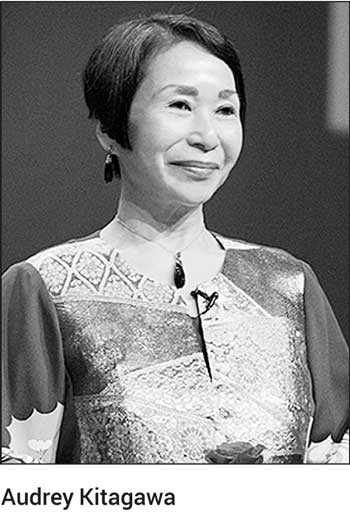Friday Feb 27, 2026
Friday Feb 27, 2026
Saturday, 24 August 2019 00:10 - - {{hitsCtrl.values.hits}}
 This Eid al-Adha dinner acknowledges an auspicious Islamic festival, and we are honoured to celebrate this moment together as representatives of different faith communities. It presents a paradigm of engagement that is at once respectful in its recognition of the dignity and sacredness that is inherent in our great religious traditions.
This Eid al-Adha dinner acknowledges an auspicious Islamic festival, and we are honoured to celebrate this moment together as representatives of different faith communities. It presents a paradigm of engagement that is at once respectful in its recognition of the dignity and sacredness that is inherent in our great religious traditions.
The Parliament of the World’s Religions is one of the oldest and largest conveners of communities of faith. It began in 1893 in the city of Chicago where for the very first time, religious leaders from the East and West came together. It was a historic model that launched the global interfaith movement that has continued to thrive and flourish all around the world.
The Parliament of the World’s Religions was created to cultivate harmony among the world’s religious and spiritual communities, and foster their engagement with the world and its guiding institutions in order to achieve a just, peaceful and sustainable world.
Renowned ethicist Hans Kung said, there can be
“No peace among the nations
without peace among the religions.
No peace among the religions
without dialogue between the religions
No dialogue between the religions
without investigation of the foundation of the religions.”
The interfaith world represents the importance of multilateral engagement to serve common goals in a willingness to cooperate with each other to find solutions to challenges that we encounter every day in our communities, countries and the world at large.
It speaks to our willingness to engage with each other, and to assiduously undertake the increasing dilation of the lens of insularity to the global lens that embraces other traditions through peaceful, dialogic processes that enhance understanding, respect and ultimately brings us to that transcendent state that places us firmly within that sacred wellspring from which all of life arises and to which all of life returns.
Over 80% of the world’s people are adherents of some faith tradition, and interfaith work represent the ability of the many faith communities to come together to help make this world a better place.
There is an increasing need for interfaith work because the paradigm of cooperative engagement expresses that creative intelligence within us that inherently understands that our ability to survive is based upon cooperating with each other.
As we travel upon the road of our sacred journey of life together, we grow in increasing awareness that the lessons of being together are the lessons of love in its many diverse manifestations that bring us into alignment with the universal spiritual laws of peace, harmony and joy.
In the growing complexity and appearance of polarisation and heightened intolerance that is marked by incidents of violence, humiliation and degradation, we often face the challenge of maintaining our own spirit of hope, dynamism and vitality.
I want to share the following message I wrote for the book, ‘100 words, 200 visionaries’:
See the sunrise, and be filled with awe and gratitude to the Creator who paints us a new sky canvas every morning. During the day take note of those who smile, hold open doors, and give up their seats on crowded buses. Commit to sharing with others similar acts of generosity of spirit and respect, and be that generative centre of change that you want to see in the world. At sunset, be filled with wonder and peace at yet another sky canvas that whispers the coming of the evening, though filled with darkness, will be punctuated by the light and the brilliant stars that unveil a map that guides us into the unknown, waiting to be discovered.
It is in the darkest of nights that the stars shine their brightest, so no matter what the external landscape may be, the nature of the human spirit is that of the eternal voyager pushing the frontiers of discovery that shepherd us all into the higher realms of consciousness.
Swami Vivekenanda, a Hindu monk from India who travelled long and far to deliver his address at the 1893 inaugural convening of the Parliament of the World’s Religions shared the truth of the human condition through which we ultimately come to the realisation that: “As the different streams having their sources in different places all mingle their water in the sea, so, O Lord, the different paths which men take through different tendencies, various though they appear, crooked or straight, all lead to Thee.”
- In the growing complexity and appearance of polarisation and heightened intolerance that is marked by incidents of violence, humiliation and degradation, we often face the challenge of maintaining our own spirit of hope, dynamism and vitality
- See the sunrise, and be filled with awe and gratitude to the Creator who paints us a new sky canvas every morning. During the day take note of those who smile, hold open doors, and give up their seats on crowded buses. Commit to sharing with others similar acts of generosity of spirit and respect, and be that generative centre of change that you want to see in the world. At sunset, be filled with wonder and peace at yet another sky canvas that whispers the coming of the evening, though filled with darkness, will be punctuated by the light and the brilliant stars that unveil a map that guides us into the unknown, waiting to be discovered